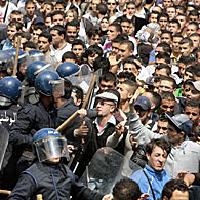
Big student demo in Algiers defies ban on demonstrations
On 12 April in Algiers, tens of thousands of students from numerous schools and universities marched through the streets of the capital, where demonstrations are still officially forbidden. The students were demonstrating against a new system of requirements for receiving academic degrees, and, in general, against problems in the universities and the lack of public funding for education. Political slogans were also heard on the demos, such as “Fed up with misery, fed up with the ministry”, “Students enraged, system get out!”, or the now familiar refrain from the Tunisian revolution: “The people want to overthrow the regime!”
Despite the heavy police presence, students were able to make the police temporarily retreat. This was followed by an assault on the students by the riot police, injuring about 100 young people.
See videos of the demo at these links:
https://www.youtube.com/watch?v=yXyTRrF1wW8&feature=player_embedded#at=158
http://www.euronews.net/2011/04/13/dozens-of-injured-in-algerian-student-protest/
This came after a week of youth riots that shook many parts of Algeria at the beginning of this year – the ending of which gave the impression of a “false start”. There has also been a poor attendance at the regular Saturday demonstrations organised against the regime in Algiers. This could be explained by the presence, within new initiatives for “change”, of former personalities and ministers involved in previous governments. After this, many commentators rapidly jumped to conclusions, declaring that Algeria had somehow “escaped” the domino effect and wind of revolution from neighboring Tunisia and Egypt.
Superficially, this might seem true, since a mass political movement against the regime is not yet on the agenda. But a look below the surface of things gives a sharply different picture. Significantly, the General Secretary of the National Liberation Front (FLN, part of the ruling alliance), recently declared, “we are not hit by what is taking place in the other Arab countries, but nothing says that we are safe”, arguing that “only the reinforcement of the internal front, unity and national cohesion can protect us against such developments”.
The weakness of political opposition in Algeria clouds, in fact, a sharp radicalisation on the social front. According to Algerian paper ‘El Watan’, March 2011 saw a new record level of social protests in the country. Working class anger has been expressed by industrial actions in virtually every sector of the economy, the numerous local protests and sit-in actions by unemployed people to demand jobs, as well as the important mobilizations of university students for several weeks. This could be the prelude to mighty movements of an unprecedented scale, that could rapidly take on a political character. This is somewhat confirmed by the growing cracks appearing inside the state apparatus and ruling circles. The fact that Algerian President, Abdelaziz Bouteflika, has not addressed the nation since last October indicates that behind the scenes, big tensions and manoeuvres are taking place.
Regime in fear
“The huge presence of police officers in the capital gives you an idea of how frightened the regime is of its people.”, recently commented a blogger activist interviewed by Al Jazeera. The confidence of the masses, though still profoundly affected by the trauma of the 1990s civil war, has been notably boosted by the removal of the state of emergency adopted on 22 February. This concession has been interpreted by the majority of the people as an open testimony of the regime’s fear of mass, revolutionary movements.

Actually, it is the majority of the population which is in a constant “state of emergency”. The French newspaper ‘Le Monde’ already reported in March that“One after another, the various sectors are moving into action: yesterday the railwaymen, today the doctors, tomorrow the fishermen. Students, unemployed, women’s rights activists, communal guards… Collectives are springing up like mushrooms in an Algeria hit by an unprecedented fever of demands. On Tuesday in Algiers, even the blind have joined the social protest to defend their rights.”
The new series of strikes has even affected sectors which usually see little protest, such as the judiciary system (with a six-day strike movement by clerks). In the last weeks, paramedics, trash collectors, chemical workers, teachers, journalists and media workers, dockers, oil and gas workers, custom officers, nuclear researchers, hotel employees,…all have engaged strike action to denounce their conditions, sometimes by openly breaking current laws. Public sector workers went on a general strike on 6 April to demand higher wages and improved conditions. According to the National Autonomous Union of Public Administration Personnel (SNAPAP), the protest was followed by 84% of members. Thousands of workers threatening to halt production at Algeria’s largest oil and natural gas company, the State-run ‘Sonatrach’ – a sort of barometer of the social temperature in the country – ended their protest after the company agreed to increase workers’ wages by 80%!
Some politicians and elements linked to the regime are trying to manipulate the general anger to settle accounts between different ruling clans. To avoid such a scenario, the most effective weapon is to build independent organisations for the youth, the working class and the poor, around a concrete plan of coordinated and unified actions. This could clear away once for all the small corrupt caste of oligarchs who have ruined the country, and establish a democratic socialist society which would ensure sustainable democratic rights, end corruption and make the mass of the people benefit from the immense resources of the country.


Be the first to comment